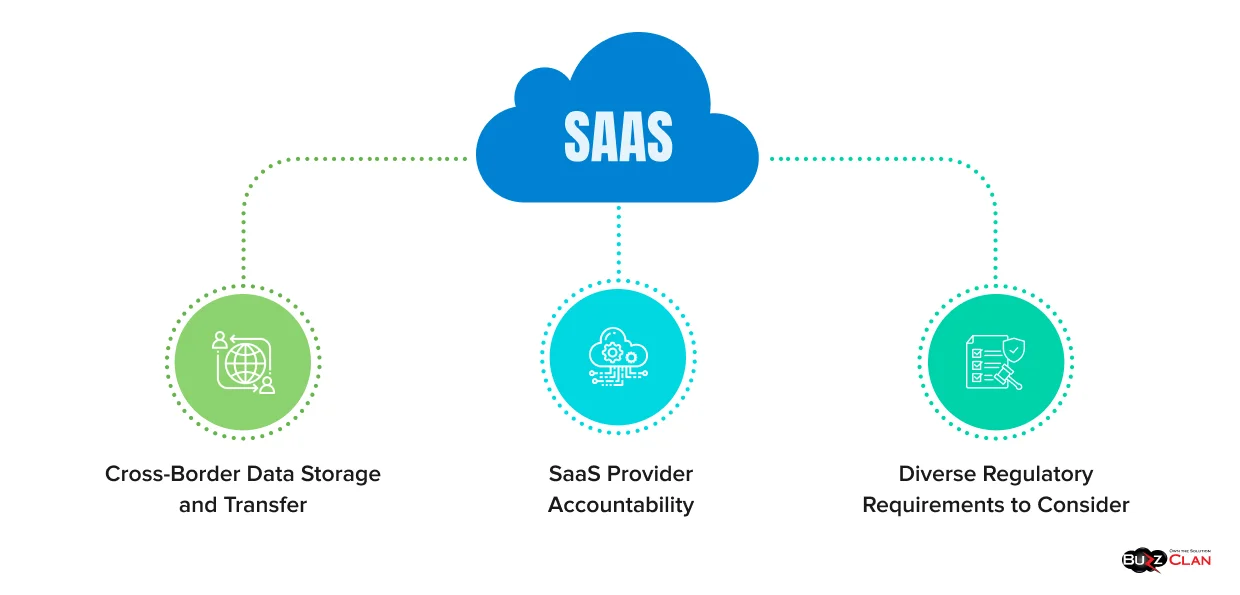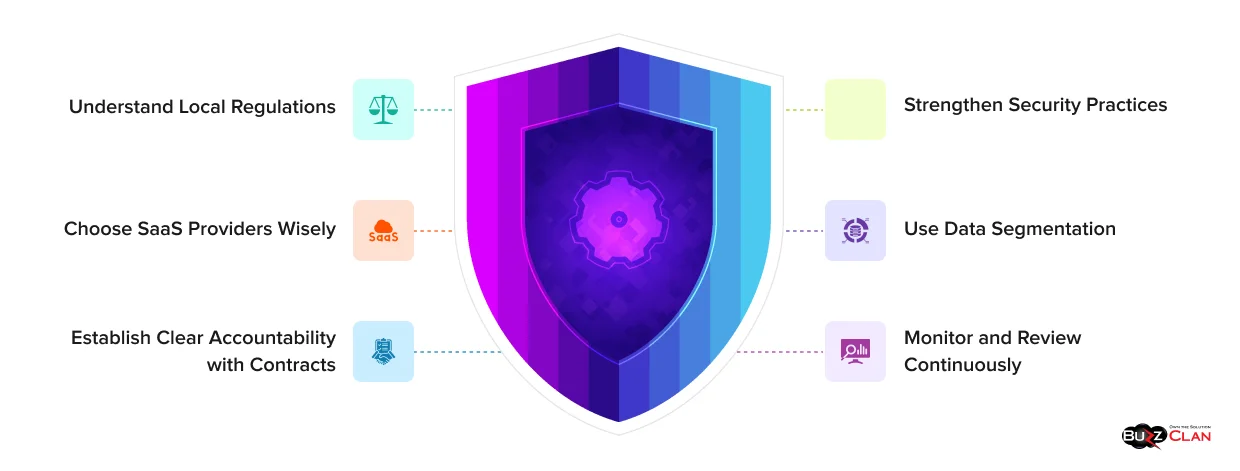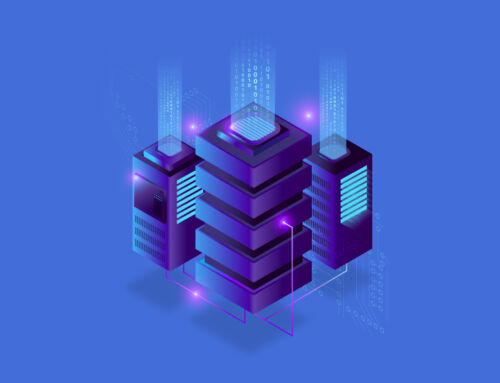Navigating Data Sovereignty and Compliance in Global SaaS Deployments
Rahul Rastogi
Oct 17, 2025
Modern businesses are increasingly relying on SaaS solutions for their operations.
And why not!
It offers unparalleled scalability and flexibility to grow and innovate faster.
However, this awesome reliance also comes with a critical challenge - data sovereignty and compliance.
Data Sovereignty is a concept that states data is subject to the laws and regulations of the country where it is collected and stored. Data compliance consists of ethical, legal, and regulatory dimensions and helps ensure organizations are following the necessary rules and guidelines to protect data.
As businesses expand globally, they are under constant pressure to guarantee compliance with local and international laws. Thus, data sovereignty has become an important component of modern privacy compliance strategies.
Why Data Sovereignty and Compliance Matter?
Data is the new currency. Businesses around the world regularly exchange data. Therefore, the country of origin must remain in control of data to protect its citizens’ sensitive information and prioritize national security concerns.
Compliance with data regulations protects data from unauthorized access, builds customer trust, and reduces the risk of hefty penalties.
For instance, industries like healthcare and finance handle highly sensitive information. So if there’s any case of non-compliance in these sectors, the liable party may incur heavy fines as well as face reputational damage.
Moreover, consumers are increasingly becoming more aware of their data collection and usage, so much so that they are explicitly withdrawing their consent for collecting, storing, and using their personal data. Users want assurance that their data is not misused and handled ethically.
“94% of consumers reported choosing brands that practice transparency, while 56% claim that they’ll be loyal for life.”
This clearly indicates how much value data privacy holds today.
Data Sovereignty and Compliance Challenges in SaaS
While consumers are responsible for ensuring their data is secure, it all comes down to businesses. They share their personal data, trusting that the company has the necessary measures in place to protect it. However, this is often not the case when you are using SaaS solutions.
Here are the primary challenges businesses face:

Cross-Border Data Storage and Transfer
Many SaaS providers often host their clients’ data in multiple regions to provide better performance and improve data availability and disaster recovery. This method is usually referred to as “multi-region” architecture and is used to enhance resilience.
However, this also means that the data being collected and stored needs to comply with data residency laws. And if the provider fails to ensure compliance with data regulations, its clients also become prey to legal repercussions.

Many SaaS providers often host their clients’ data in multiple regions to provide better performance and improve data availability and disaster recovery. This method is usually referred to as “multi-region” architecture and is used to enhance resilience.
However, this also means that the data being collected and stored needs to comply with data residency laws. And if the provider fails to ensure compliance with data regulations, its clients also become prey to legal repercussions.
Diverse Regulatory Requirements to Consider
Different regions have different regulatory rules for data collection, storage, and processing. Some of them are:
Data Privacy & Protection
- GDPR(General Data Protection Regulation) - This law in the European Union protects the personal data of EU citizens. It applies to companies that process or collect the data of EU residents.
- California’s CPA (California Consumer Privacy Act) - The law was introduced to give consumers control over their personal data.
- China’s Cybersecurity Law - This law requires that certain data be stored within the country.
- LGPD (Lei Geral de Proteção de Dados, Brazil) – Brazil’s GDPR-style law regulating the collection and processing of personal data.
- PDPA (Personal Data Protection Act, Singapore/Thailand) – Governs how personal data is collected, used, and disclosed.
- India DPDP Act (Digital Personal Data Protection Act, 2023) – India’s law mandating consent-based handling of digital personal data.
Security Standards & Certifications
- SOC 2 (System and Organization Controls, US) – Certifies SaaS providers on security, availability, and privacy controls.
- ISO/IEC 27001 (International) – Global standard for establishing and managing information security systems.
- FedRAMP (Federal Risk and Authorization Management Program, US) – Mandatory certification for SaaS vendors serving US government agencies.
- Cyber Essentials (UK) – Government-backed cybersecurity certification ensuring basic protection against cyber threats.
Industry-Specific Regulations
- Health Insurance Portability and Accountability Act (HIPAA) - This is a federal law in the United States. It protects the privacy and security of protected health information.
- PCI DSS (Payment Card Industry Data Security Standard, Global) – Sets rules for secure processing and storage of credit card data.
- GLBA (Gramm-Leach-Bliley Act, US) – Requires financial institutions and related SaaS to safeguard sensitive customer financial data.
Financial & Tax Compliance
- SOX (Sarbanes-Oxley Act, US) – Enforces strict internal controls and financial reporting for public companies.
- VAT/GST on SaaS (Global) – Requires SaaS providers to charge and remit consumption taxes based on customer location.
- ASC 606 / IFRS 15 (Accounting Standards) – Regulates how SaaS companies recognize subscription and contract revenue.
Emerging & Evolving Regulations
- EU AI Act (EU) – Regulates AI systems based on risk levels, imposing strict requirements for high-risk AI.
- US AI Policy Frameworks (US) – Evolving guidelines for responsible AI usage and governance.
- Cloud Data Residency Laws (India, Russia, China, etc.) – Require certain categories of data to be stored within national borders.
There are many more such laws that exist globally. For a multinational business, staying compliant with all these regulatory laws is not only imperative but also mandatory.
SaaS Provider Accountability
Since you’re dependent on your SaaS provider for data storage and management, the onus is on them to adhere to local data laws and protect sensitive information. However, ensuring your provider takes responsibility for meeting compliance standards presents its own set of challenges, such as:
- Verifying jurisdictional compliance – Many SaaS vendors operate globally, but not all can guarantee compliance in every region (e.g., GDPR in the EU, HIPAA in the US, DPDP in India).
- Assessing data handling policies – Businesses must review how vendors encrypt data, manage access controls, and define retention or deletion timelines.
- Validating certifications and audits – Look for industry standards like SOC 2, ISO 27001, or FedRAMP, and confirm whether third-party audits are performed regularly.
- Shared responsibility gaps – Compliance is often a shared model; while the provider secures the infrastructure, the customer is still responsible for proper configurations and access management.
- Limited transparency – Vendors may not always disclose where data is stored or processed, creating hidden risks around sovereignty.
Best Practices for Navigating Data Sovereignty and Compliance
As it may be evident by now, failing to meet data compliance can have negative repercussions for your business and its consumers. This is why it is strongly recommended to give data sovereignty and compliance the priority it deserves and have a compliance strategy in place to safeguard customer data.
Here are a few best practices you can follow:

Understand Local Regulations
Identify the data protection laws that apply in each region you operate. Some regulations, like GDPR in Europe or DPDP in India, place strict requirements on where data can be stored and how it is handled. Understanding these rules upfront helps you align your SaaS usage with legal expectations and reduces unexpected compliance issues.
Choose SaaS Providers Wisely
Choose vendors that not only meet regulatory standards but also demonstrate a strong commitment to protecting sensitive data. Providers with certifications such as SOC 2, ISO 27001, or FedRAMP offer transparency and confidence that their processes are regularly reviewed.
Use Data Segmentation
Keep customer data within appropriate regions whenever possible, especially sensitive or regulated information. This ensures that you meet local data residency requirements while also maintaining control over access and usage.
Strengthen Security Practices
Relying on a SaaS provider doesn’t remove your responsibility for security. Strong encryption, role-based access controls, multi-factor authentication, and regular security assessments help protect data from unauthorized access and demonstrate regulatory diligence.
Establish Clear Accountability with Contracts
Clearly define the responsibilities of your SaaS provider regarding data handling, storage locations, breach notifications, and compliance obligations. Well-documented agreements make it easier to monitor adherence and address any issues promptly.
Monitor and Review Continuously
Regulations and business needs evolve, so ongoing oversight is essential. Periodic audits, updated certifications, and monitoring of how your provider manages data help maintain compliance and protect sensitive information over time.
The Role of SaaS Providers in Ensuring Compliance
Many SaaS providers are adopting a compliance-first approach to ensure that the data they collect and store remains safe and secure. They provide features such as data localization, encryption as standards, compliance dashboards, and more. Thus, they allow businesses to focus on innovation and growth while eliminating the burden of staying on top of evolving regulatory compliance.
Conclusion
Data sovereignty is evolving at a breakneck speed. There will be significant changes in the future, driven by continuous advancements in technology such as the emergence of AI. Government agencies are also expected to play a crucial role in the field by introducing new regulations and laws.
For organizations relying on SaaS, staying ahead means more than understanding the rules. They need to work with providers who prioritize compliance, security, and responsible data management. By actively monitoring regulations and selecting partners committed to best practices, businesses can protect sensitive data, maintain customer trust, and confidently navigate an increasingly complex regulatory landscape.

Identify the data protection laws that apply in each region you operate. Some regulations, like GDPR in Europe or DPDP in India, place strict requirements on where data can be stored and how it is handled. Understanding these rules upfront helps you align your SaaS usage with legal expectations and reduces unexpected compliance issues.
Choose vendors that not only meet regulatory standards but also demonstrate a strong commitment to protecting sensitive data. Providers with certifications such as SOC 2, ISO 27001, or FedRAMP offer transparency and confidence that their processes are regularly reviewed.
Keep customer data within appropriate regions whenever possible, especially sensitive or regulated information. This ensures that you meet local data residency requirements while also maintaining control over access and usage.
Relying on a SaaS provider doesn’t remove your responsibility for security. Strong encryption, role-based access controls, multi-factor authentication, and regular security assessments help protect data from unauthorized access and demonstrate regulatory diligence.
Clearly define the responsibilities of your SaaS provider regarding data handling, storage locations, breach notifications, and compliance obligations. Well-documented agreements make it easier to monitor adherence and address any issues promptly.
Regulations and business needs evolve, so ongoing oversight is essential. Periodic audits, updated certifications, and monitoring of how your provider manages data help maintain compliance and protect sensitive information over time.
Many SaaS providers are adopting a compliance-first approach to ensure that the data they collect and store remains safe and secure. They provide features such as data localization, encryption as standards, compliance dashboards, and more. Thus, they allow businesses to focus on innovation and growth while eliminating the burden of staying on top of evolving regulatory compliance.
Data sovereignty is evolving at a breakneck speed. There will be significant changes in the future, driven by continuous advancements in technology such as the emergence of AI. Government agencies are also expected to play a crucial role in the field by introducing new regulations and laws.
For organizations relying on SaaS, staying ahead means more than understanding the rules. They need to work with providers who prioritize compliance, security, and responsible data management. By actively monitoring regulations and selecting partners committed to best practices, businesses can protect sensitive data, maintain customer trust, and confidently navigate an increasingly complex regulatory landscape.
Ensure your SaaS strategy meets today’s compliance standards and protects your data. Connect with our experts to assess your current setup and safeguard your business for the future.
FAQs

Get In Touch
